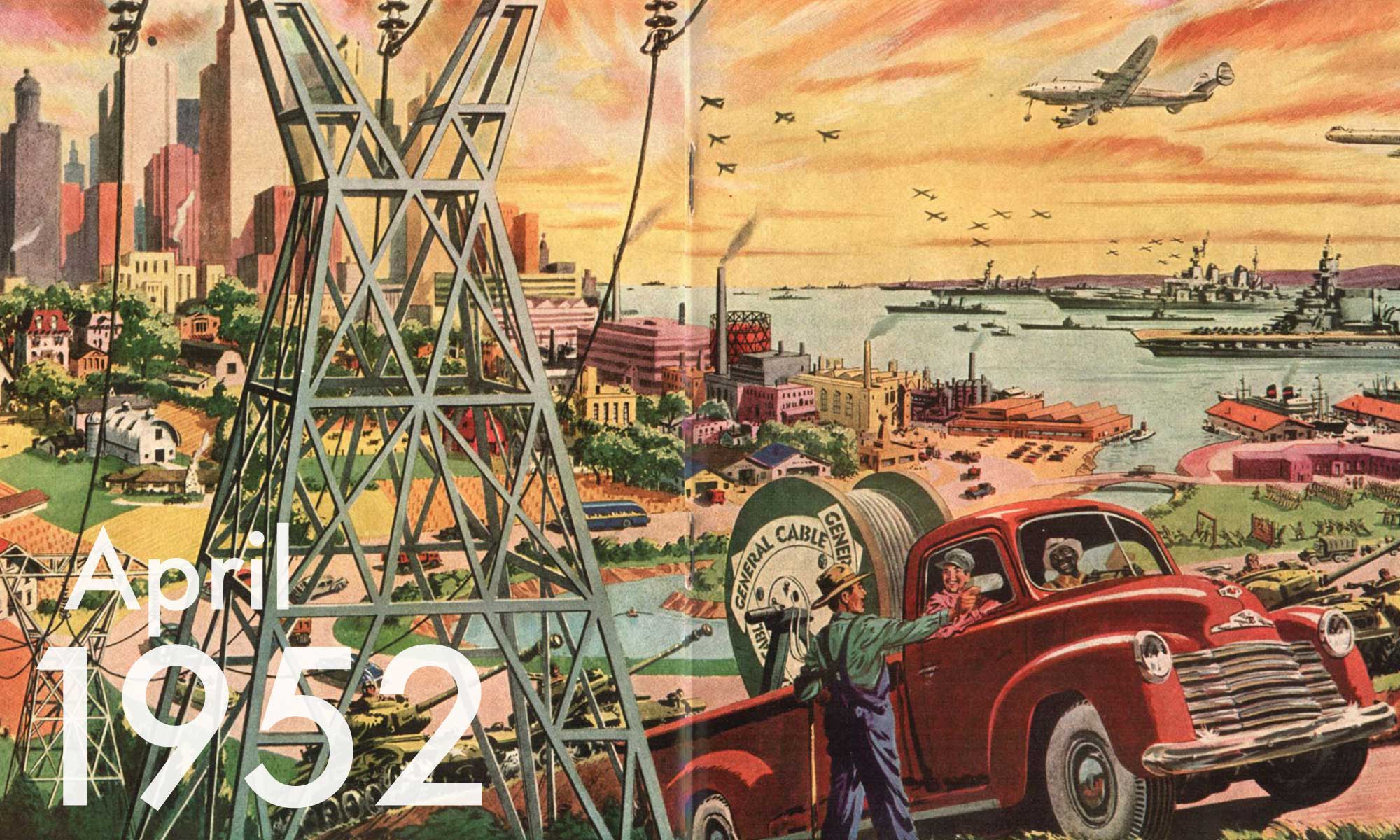| ◄ APRIL ► | ||||||
|---|---|---|---|---|---|---|
| ◄ 1952 ► | ||||||
| 1 | 2 | 3 | 4 | 5 | ||
| 6 | 7 | 8 | 9 | 10 | 11 | 12 |
| 13 | 14 | 15 | 16 | 17 | 18 | 19 |
| 20 | 21 | 22 | 23 | 24 | 25 | 26 |
| 27 | 28 | 29 | 30 | |||
| President: | Harry S Truman (D) | |||
| Vice-President: | Alben W. Barkley (D) | |||
| House: | 231 (D) | 202 (R) | 1 (Other) | 1 (Vacant) |
| Southern states: | 103 (D) | 2 (R) | ||
| Senate: | 50 (D) | 46 (R) | ||
| Southern states: | 22 (D) | |||
| GDP growth: | 2.2% | (Annual) | ||
| 0.7% | (Quarterly) | |||
| Inflation: | 2.3% | |||
| Unemployment: | 2.9% | |||
| US killed in action, | 313 | (This month) | ||
| Korean conflict: | 28,317 | (Since Jun 28, 1950) | ||
![]() Apr 1: A new series of nuclear tests begins at the Nevada Nuclear Test Site when a small atomic bomb is dropped from an aircraft and detonated at about 3,000 feet. The 1-kiloton explosion, just one-sixteenth the power of the Hiroshima bomb, is used to help resolve discrepancies between the measured and estimated blast shock wave damage found in earlier detonations.
Apr 1: A new series of nuclear tests begins at the Nevada Nuclear Test Site when a small atomic bomb is dropped from an aircraft and detonated at about 3,000 feet. The 1-kiloton explosion, just one-sixteenth the power of the Hiroshima bomb, is used to help resolve discrepancies between the measured and estimated blast shock wave damage found in earlier detonations.
![]() Apr 4: The House of Representatives orders an investigation proposed by Rep. Eugene Cox (D-GA) into allegations that several tax-exempt organizations are funding Communist or Communist-front organizations. Cox singles out the Rockefeller Foundation, the Guggenheim Foundation, the Robert Marshall Foundation and the Rosenwald Fund for special scrutiny. The House tasks the committee with determining whether these organizations “are using their resources for un-American and subversive activities or for purposes not in the interest or tradition of the United States.”
Apr 4: The House of Representatives orders an investigation proposed by Rep. Eugene Cox (D-GA) into allegations that several tax-exempt organizations are funding Communist or Communist-front organizations. Cox singles out the Rockefeller Foundation, the Guggenheim Foundation, the Robert Marshall Foundation and the Rosenwald Fund for special scrutiny. The House tasks the committee with determining whether these organizations “are using their resources for un-American and subversive activities or for purposes not in the interest or tradition of the United States.”
![]()
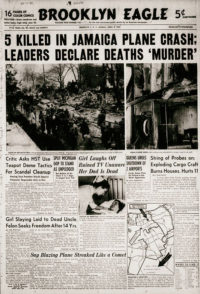 Apr 5: A C-46 cargo plane crashes into the Jamaica section of Brooklyn, killing two crew members and three others on the ground. The crash occurs after the aircraft had missed one landing attempt at Idlewild Airport and is circling around for another attempt. New York’s two airports have been struggling to handle the increased air traffic caused by the decision to shut down Newark Airport in March after three airliners crashed in Elizabeth, New Jersey, in less than two months.
Apr 5: A C-46 cargo plane crashes into the Jamaica section of Brooklyn, killing two crew members and three others on the ground. The crash occurs after the aircraft had missed one landing attempt at Idlewild Airport and is circling around for another attempt. New York’s two airports have been struggling to handle the increased air traffic caused by the decision to shut down Newark Airport in March after three airliners crashed in Elizabeth, New Jersey, in less than two months.
![]()
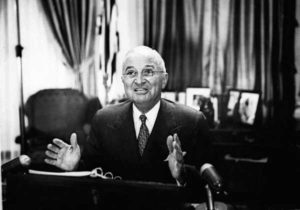 Apr 8: To head off an imminent strike by steelworkers that threaten to interrupt supplies to defense companies, President Harry Truman announces over radio and television that he has nationalized the steel mills. The United Steelworkers of America call off their strike and direct its 600,000 members to work “as patriotic Americans” under Truman’s seizure order. While Truman’s action is popular among union workers, it will be met with stiff resistance from both parties in Congress and his popularity will plummet further to historic lows.
Apr 8: To head off an imminent strike by steelworkers that threaten to interrupt supplies to defense companies, President Harry Truman announces over radio and television that he has nationalized the steel mills. The United Steelworkers of America call off their strike and direct its 600,000 members to work “as patriotic Americans” under Truman’s seizure order. While Truman’s action is popular among union workers, it will be met with stiff resistance from both parties in Congress and his popularity will plummet further to historic lows.
![]() Apr 11: Gen. Dwight D. Eisenhower announces that he is stepping down as Supreme Commander of the Allied Powers in Europe on June 1, saying that his mission of establishing a NATO force in Europe is largely completed. He requests that he be returned to inactive status, and says he will resign from the Army entirely if he wins the Republican presidential nomination. He tells reporters, “If, by any chance, it should come about that the Republican party does name me as its standard bearer I am determined to lead the entire organization in a fight in which there will be no cessation, no rest and no lack of intensity until the final decision is made.”
Apr 11: Gen. Dwight D. Eisenhower announces that he is stepping down as Supreme Commander of the Allied Powers in Europe on June 1, saying that his mission of establishing a NATO force in Europe is largely completed. He requests that he be returned to inactive status, and says he will resign from the Army entirely if he wins the Republican presidential nomination. He tells reporters, “If, by any chance, it should come about that the Republican party does name me as its standard bearer I am determined to lead the entire organization in a fight in which there will be no cessation, no rest and no lack of intensity until the final decision is made.”
![]()
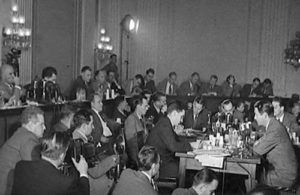 Apr 11: Producer and director Elia Kazan tells the House Un-American Activities Committee that he had been a member of the Communist Party for two years before quitting in 1936. Kazan had appeared before the committee in a closed session the previous January, when he admitted his past association but decline to identify party associates. This time, he’s ready to name names. “It is my duty as a citizen,” he tells the committee, “to tell everything I know.” He names eight people he says were Communists. All of these names were already known to HUAC. Kazan’s testimony will save his career but cost him many friends and the esteem of many of his colleagues.
Apr 11: Producer and director Elia Kazan tells the House Un-American Activities Committee that he had been a member of the Communist Party for two years before quitting in 1936. Kazan had appeared before the committee in a closed session the previous January, when he admitted his past association but decline to identify party associates. This time, he’s ready to name names. “It is my duty as a citizen,” he tells the committee, “to tell everything I know.” He names eight people he says were Communists. All of these names were already known to HUAC. Kazan’s testimony will save his career but cost him many friends and the esteem of many of his colleagues.
![]() Apr 11: Fifty-two people are killed when a Pan Am DC-4 crashes into the harbor and sinks at San Juan, Puerto Rico. Seventeen on board survive, including all five crew members.
Apr 11: Fifty-two people are killed when a Pan Am DC-4 crashes into the harbor and sinks at San Juan, Puerto Rico. Seventeen on board survive, including all five crew members.
![]()
 Apr 15: The B-52 Stratofortress flies for the first time. The long-range bomber is powered by eight turbojet engines and is designed to carry atomic weapons. Production will begin in 1954, and the new bomber will enter operational service in 1955. Thanks to numerous upgrade and refurbishment programs over the next several decades, the B-52 will likely remain in operational service into the 2050s.
Apr 15: The B-52 Stratofortress flies for the first time. The long-range bomber is powered by eight turbojet engines and is designed to carry atomic weapons. Production will begin in 1954, and the new bomber will enter operational service in 1955. Thanks to numerous upgrade and refurbishment programs over the next several decades, the B-52 will likely remain in operational service into the 2050s.
![]()
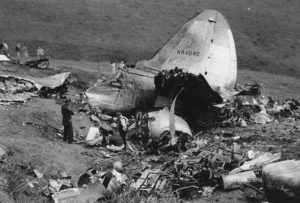 Apr 18: The pilot of a North Continent Airlines C-46 Curtiss Commando airliner loses his bearings in an early morning overcast and crashes into a hillside in the Los Angeles suburb of Whittier Heights. All twenty-nine on board are killed. The Civil Aeronautics Administration immediately orders the airline to suspend operations due to “an operating history involving violations of civil air regulations” and past accidents. The airline, previously known as Robin Airlines, had gone out of business after a crash the previous December, but re-entered service as North Continent without obtaining CAA authorization for the name change.
Apr 18: The pilot of a North Continent Airlines C-46 Curtiss Commando airliner loses his bearings in an early morning overcast and crashes into a hillside in the Los Angeles suburb of Whittier Heights. All twenty-nine on board are killed. The Civil Aeronautics Administration immediately orders the airline to suspend operations due to “an operating history involving violations of civil air regulations” and past accidents. The airline, previously known as Robin Airlines, had gone out of business after a crash the previous December, but re-entered service as North Continent without obtaining CAA authorization for the name change.
![]()
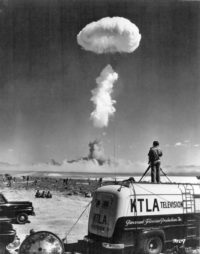 Apr 22: Another atomic device is detonated at the Nevada Nuclear Test Site 75 miles northwest of Las Vegas. Pioneering Los Angeles television station KTLA rushed to erect a series of microwave links from the test site to Los Angeles so that the 9:30 a.m. blast can be televised live to L.A. viewers for the first time. And with AT&T’s brand new coast-to-coast television link now operational, this detonation is the first nuclear test to be broadcast live on network television. An estimated audience of five million viewers witness the awesome power of the 31-kiloton blast, about twice the power of the bomb dropped on Hiroshima. Other witnesses include about 2,100 troops participating in ground maneuvers following the blast. Some of those troops are in fox holes as close as four miles from ground zero. Their maneuvers following the blast will bring them to within 150 yards of ground zero.
Apr 22: Another atomic device is detonated at the Nevada Nuclear Test Site 75 miles northwest of Las Vegas. Pioneering Los Angeles television station KTLA rushed to erect a series of microwave links from the test site to Los Angeles so that the 9:30 a.m. blast can be televised live to L.A. viewers for the first time. And with AT&T’s brand new coast-to-coast television link now operational, this detonation is the first nuclear test to be broadcast live on network television. An estimated audience of five million viewers witness the awesome power of the 31-kiloton blast, about twice the power of the bomb dropped on Hiroshima. Other witnesses include about 2,100 troops participating in ground maneuvers following the blast. Some of those troops are in fox holes as close as four miles from ground zero. Their maneuvers following the blast will bring them to within 150 yards of ground zero.
![]() Apr 23: Gen. Dwight D. Eisenhower wins the Pennsylvania Republican presidential preference primary in a landslide over Ohio Sen. Robert Taft and former Minnesota governor Harold Stassen. Eisenhower even collects 4,900 write-in votes in the Democratic primary.
Apr 23: Gen. Dwight D. Eisenhower wins the Pennsylvania Republican presidential preference primary in a landslide over Ohio Sen. Robert Taft and former Minnesota governor Harold Stassen. Eisenhower even collects 4,900 write-in votes in the Democratic primary.
![]() Apr 28: The U.S. State Department imposes a travel ban to countries behind the Iron Curtain. All passports are amended with a stamped restriction reading: “This passport is NOT valid for travel to Albania, Bulgaria, China, Czechoslovakia, Hungary, Poland, Rumania, or the Union of Soviet Socialist Republics unless specifically endorsed under authority of the Department of State as being valid for such travel.” A State Department announcement says that the new policy “in no way forbids” travel to the listed countries, but that American citizens should “consult the department or the consulates abroad to ascertain the dangers of traveling in countries where acceptable standards of protection do not prevail and that, if no objection is perceived, the travel may be authorized.” The ban is designed to curb sneak visits to forbidden areas, and to protect American travelers from seizure by Communist authorities on trumped up charges. Yugoslavia is not part of the ban, likely due to its Western-leaning leader, Marshall Josip Tito, who has been charting an independent course from Moscow.
Apr 28: The U.S. State Department imposes a travel ban to countries behind the Iron Curtain. All passports are amended with a stamped restriction reading: “This passport is NOT valid for travel to Albania, Bulgaria, China, Czechoslovakia, Hungary, Poland, Rumania, or the Union of Soviet Socialist Republics unless specifically endorsed under authority of the Department of State as being valid for such travel.” A State Department announcement says that the new policy “in no way forbids” travel to the listed countries, but that American citizens should “consult the department or the consulates abroad to ascertain the dangers of traveling in countries where acceptable standards of protection do not prevail and that, if no objection is perceived, the travel may be authorized.” The ban is designed to curb sneak visits to forbidden areas, and to protect American travelers from seizure by Communist authorities on trumped up charges. Yugoslavia is not part of the ban, likely due to its Western-leaning leader, Marshall Josip Tito, who has been charting an independent course from Moscow.
![]() Apr 29: Federal District Judge David Pine rules that President Truman does not have the power to nationalize the nation’s steel mills: “There is no express grant of power in the Constitution authorizing the President to direct this seizure. There is no grant of power from which it reasonably can be implied. There is no enactment of Congress authorizing it.” The United Steel Workers immediately announce that they will resume their strike.
Apr 29: Federal District Judge David Pine rules that President Truman does not have the power to nationalize the nation’s steel mills: “There is no express grant of power in the Constitution authorizing the President to direct this seizure. There is no grant of power from which it reasonably can be implied. There is no enactment of Congress authorizing it.” The United Steel Workers immediately announce that they will resume their strike.
![]() Apr 30: The Justice Department asks Federal District Judge David Pine to stay his ruling against President Truman’s nationalizing the country’s steel mills. Pine refuses to do so, and the United Steelworkers of America resume their nationwide strike. The government then appeals to the Court of Appeals for the District of Columbia Circuit, which decides, 5-4 in an en banc ruling, to stay the lower court’s decision until May 2. This places the nation’s steel mills back under government control. If the U.S. Supreme Court agrees to hear the case, then the stay will remain in effect until the Supreme Court’s ruling.
Apr 30: The Justice Department asks Federal District Judge David Pine to stay his ruling against President Truman’s nationalizing the country’s steel mills. Pine refuses to do so, and the United Steelworkers of America resume their nationwide strike. The government then appeals to the Court of Appeals for the District of Columbia Circuit, which decides, 5-4 in an en banc ruling, to stay the lower court’s decision until May 2. This places the nation’s steel mills back under government control. If the U.S. Supreme Court agrees to hear the case, then the stay will remain in effect until the Supreme Court’s ruling.
![]() Apr 30: About 90,000 oil workers go on strike across the country, shutting down refineries and curtailing pipeline operations. Union officials estimate that about 45% of the nation’s refinery capacity will be affected by the strike. The cuts could go even deeper if the supply of crude oil is reduced by pipeline strikes.
Apr 30: About 90,000 oil workers go on strike across the country, shutting down refineries and curtailing pipeline operations. Union officials estimate that about 45% of the nation’s refinery capacity will be affected by the strike. The cuts could go even deeper if the supply of crude oil is reduced by pipeline strikes.
![[Emphasis Mine]](http://jimburroway.com/wp-content/uploads/2018/01/RainbowWhiteHouse.jpg)
